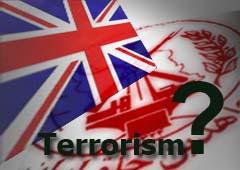Iran and the UK have historically had a very turbulent relationship which goes back to centuries, not decades.
The root of the strained relations between the two countries can be traced back even before the Iranian revolution in 1979. Britain has inflicted huge damage on Iranian independence and interests. Replacing one leader with another with more loyalty to the UK ambitions, its oppressive tobacco monopoly in 1890, installing dynasty of Pahlavi, supporting the coup against the democratically elected leader Mosadeq in 1953 and bringing back to power Mohammad Reza Shah. These are some of the examples of the atrocities committed by UK against Iranian people. The most painful of all has been the overthrow of Popular government of Dr. Mosadegh. This was done in retaliation of Dr. Mosadegh’s action of nationalizing the Anglo-Iranian oil company. At that time British had a majority of oil share which was unfair and unjust.
The former British Foreign Secretary Jack Straw in an Interview with BBC Persian which was aired in November 5, 2013 confessed to British colonial intentions against Iran and its unfair treatment of the nation.
Straw who now serves as a member of parliament, mentioned reinstatement of Muhammad Reza Shah in the throne and supporting its brutal regime, Anglo-Iranian Oil Company, supporting Saddam Hussein and arming him against Iran. He also referred to the 1953 coup of Iranian elected Prime Minister. [1]
Flashing back at the history it is not surprising that Iranians do not trust the UK’s intentions, according to the Straw.
It is not the first time the former British Foreign Secretary admits the prolonged history of UK interventions in Iran’s internal affairs. In a Daily Telegraph article in February 2013, Straw made reference to the active interference of Britain in Iran’s affairs from the 19th century on:
"From an oppressive British tobacco monopoly in 1890, through truly extortionate terms for the extraction of oil by the D’Arcy petroleum company (later BP), to putting Reza Shah on the throne in the 1920s; from jointly occupying the country, with the Soviet Union, from 1941-46, organising (with the CIA) the coup to remove the elected prime minister Mohammad Mossadegh in 1953, then propping up the increasingly brutal regime of the Shah until its collapse in 1979, our role has not been a pretty one. Think how we’d feel if it had been the other way round"[2]
Britain’s protracted history of meddling in Iranian politics has caused the Iranian people whether reformist, conservative, or with any other political orientation to be suspicious and skeptic towards Britain.
Like any other politician, Straw made this remarks just as historical mistakes by his countries’ politicians. He didn’t make any reference of the current unfair policy against Iranian nation, such as illegal and inhumane sanctions against Iranian people. This is done under the pretext of fabricated and unfounded evidence over Iran’s civilian nuclear program. Another point that Mr. Straw failed to mention was delisting of Mujahedin Khalq from terrorist groups. There are many concrete evidence that this group has been involved in a number of terrorist activities such as assassination of Iranians and Western targets.
Michael Rubin ex-pentagon officials in an article published in Commentary Magazine, called the group dishonest – creepy cult. Having lived in Iran during the 1990s, Rubin said: “The only thing on which Iranians agreed was their dislike of the Mojahedin al-Khalq Organization (MKO),” [3]
Once the group was delisted by the UK, there were ample and indisputable evidence to prove that it was a terrorist organization. UK Home Secretary Jacqui Smith said she was very disappointed with the ruling. Home Officer lawyers had argued that although there had been a "temporary cessation of terrorist acts", there was reason to suspect the halt was only "for pragmatic reasons" and attacks might be resumed in the future. [4]
Yet after all heated discussions the UK lifted the ban on Mujahedin Khalq as a proscribed terrorist group due to political considerations and some hidden agenda.
However, 5 years after the delisting, in response to an MP asking about the immigration status of 52 Camp Liberty residents who are seeking resettlement in the UK, British Secretary of State for the Home Department said that the UK has agreed to consider, exceptionally, their re-admission as refugees, subject to a UN High Commissioner for Refugees (UNHCR) assessment of each individual to ensure that none have been complicit in acts of terrorism or other activities incompatible with refugee status."[5]
Harper also said that the UNHCR has submitted 17 assessments to the Home Office, adding that “no decision has yet been reached”.[6]
Today that the UK government is seriously concerned about the security and protection of its citizens , it is reluctant to give asylum to the members of a terror cult group with a dark history of violence and terror- even if the group was delisted by the same government .
By: A. Sepinoud
References:
[1]Iranian.com, Former British foreign minister Jack Straw asks for forgiveness from Tehran in BBC Persian studio !, November6,2013
[2] Straw, Jack, Even if Iran gets the Bomb, it won’t be worth going to war, telegraph.co.uk, February25, 2013
[3]Rubin,Michael, Yes, Mujahedin al-Khalq is a dishonest cult, Commentary Magazine, July7, 2013
[4] bbc.co.uk, UK’s ‘terror’ ban appeal denied, May7, 2008
[5] UK Parliament, Britain may admit 17 Liberty residents with no links to terrorism, October 30, 2013
[6]ibid

